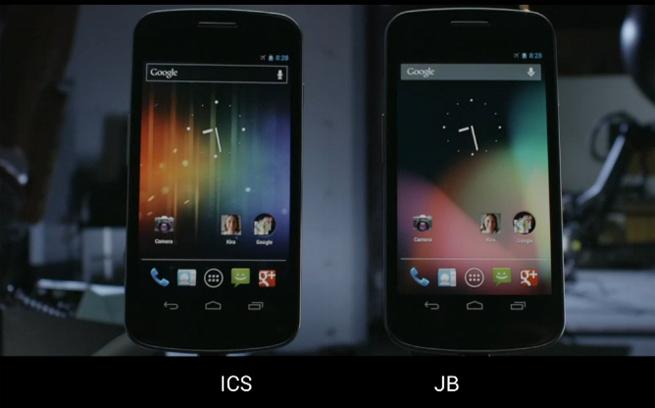Google has just unveiled some fascinating new details on Jelly Bean, the latest version of Android, at Google I/O, the company’s developer conference taking place in San Francisco this week.
[aditude-amp id="flyingcarpet" targeting='{"env":"staging","page_type":"article","post_id":480864,"post_type":"story","post_chan":"none","tags":null,"ai":false,"category":"none","all_categories":"dev,mobile,","session":"B"}']The Android maker confirmed the Jelly Bean name earlier this week with a giant jelly bean sculpture at its Mountain View campus.
The launch comes just a couple weeks after the launch of iOS 6, Apple’s new and improved mobile OS at its San Francisco developer conference, WWDC.
AI Weekly
The must-read newsletter for AI and Big Data industry written by Khari Johnson, Kyle Wiggers, and Seth Colaner.
Included with VentureBeat Insider and VentureBeat VIP memberships.
In a brief demonstration, Google showed off Jelly Bean’s revamped home screen, which now automatically rearranges icons when you’re moving apps and widgets around. The new OS sports a “refined dictionary” and a predictive keyboard (that’s hopefully better than past Android keyboards). Google is also bringing Voice Typing offline in Jelly Bean, which should be a big plus for dictation junkies.
Jelly Bean’s camera app has also been updated to allow for easier browsing of photos. The interface looks smoother and simpler than the Ice Cream Sandwich camera.
Google detailed the extensive design work that went into Jelly Bean, an initiative the company calls Project Butter. Jelly Bean features triple buffering in the Android graphics pipeline and Vsync, which keeps the frame rate consistent with your device’s display. The result is that just about everything in the new OS looks “buttery smooth.”
As expected, Google also unveiled its own take on Apple’s Siri virtual assistant in Jelly Bean, though it’s spreading those capabilities across the operating system’s search functionality. Now, when you dictate search queries to Android, you can get back specific answers quickly. A Google employee asked “What is the definition of a robot?” and Jelly Bean responded with a helpful dictionary-quality breakdown. Compared to the various iterations of Siri, Google’s robotic assistant voice sounds pretty natural.
Google is also taking the virtual assistant concept a step further with Google Now, a new intelligent search feature. Google Now searches your history, calendar, and other data to figure out your queries. It can figure out your schedule and routines — so, for example, your phone can redirect you around traffic jams in the morning automatically. Google Now also has some advanced functionality, like the capability to book sporting event tickets or a reservation at a restaurant. There’s some strange self-awareness going on with Google Now, so we’re interested to see how much more useful it is than Siri.
Google confirmed that it plans to release Jelly Bean in mid-July to the Galaxy Nexus, Nexus S, and Motorola Xoom tablet.
[aditude-amp id="medium1" targeting='{"env":"staging","page_type":"article","post_id":480864,"post_type":"story","post_chan":"none","tags":null,"ai":false,"category":"none","all_categories":"dev,mobile,","session":"B"}']
Jelly Bean’s predecessor was Ice Cream Sandwich, a mobile OS aimed at addressing many of the fragmentation concerns that have long plagued the Android ecosystem. By tailoring Ice Cream Sandwich to run on tablets, smartphones, and other devices, Google hoped to bring some much-needed unity to the ever-growing Android platform.
We’ll be attending a special Jelly Bean-flavored developer session in an hour, so stay tuned for more Android news and details.
VentureBeat's mission is to be a digital town square for technical decision-makers to gain knowledge about transformative enterprise technology and transact. Learn More

